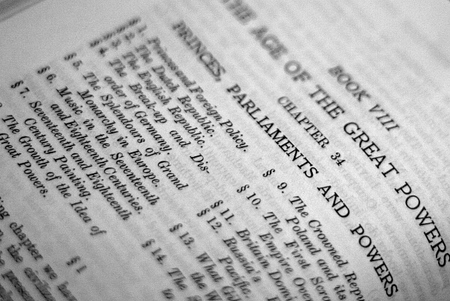I can’t help but get excited when I see an old book with this kind of traditional font. It doesn’t really matter what it’s about, the very feel of it adds gravitas and a suggestion of learning. It’s a bit like old people being deserving of respect, they may have been useless nutters in their youth, so you should listen to them. I think old books are the same, they come from the age of great powers, when it was proper hard to even make a book. If it was worth the effort to make, maybe it’s worth the effort to read.
Reminds me, somewhat incongruously, of a line from Jurassic Park…
You stood on the shoulders of geniuses to accomplish something as fast as you could and before you even knew what you had you patented it and packaged it and slapped it on a plastic lunchbox
I wonder if, as a result of progress, we produce a lot more tripe as eBooks etc than in the day when the construction of the book alone was an art? Of course we do, what am I saying?
You’ll often see me trawling the second-hand bookshops hunting for the wisdom of the ancients and the smell of a thousand musty hands. In this case, “The Outline of History” by H.G. Wells from 1919 (my edition is 1930). It was flicking through this that sparked the thought.
It could be considered a little disingenuous to rattle on about the poor quality of most of what is self-published – I’ll leave others to judge me on that – but, simply because it’s so easy to do, it is almost guaranteed that things that should have stayed as hand-written pages in a box file in the attic now make it into something that appears like the book world (c.f. Jasper Fforde ). The 1000+ pages of this book by H.G. Wells must have taken weeks/months to type set. This is a massive barrier to entry and one that necessitates some indication of quality before it can be crossed.
The sad fact is that at no point in the future will people be seen trawling through virtual shops and delighting and finding most of the eBooks of today. Don’t get me wrong, I support anyone and everyone writing and publishing their work. My point is that there is implied quality from something you can pick up that has passed any quality test to make it there. And, specifically, old books are fabulous things – not just because they are old but because you can assume that, to go through the pain of making it, there must be an indication of quality. I’m sure you have come across an old rubbish book, but even the rubbish ones form part of the fabric of social history. Perhaps a lot of the books produced today will ultimately serve the same purpose but more in relation to the nature of their birth rather than their content.
The simple point is that I will always delight in the physical book. There may be elements of convenience from having an iPad full of books – but the emotional response is entirely different. Books are great and the older a book is, the more likely it is to have some merit.
Before anyone else points it out, I will say that my argument suggests that my book should similarly be consigned to the big bin of history because it failed to make it over the barrier (admittedly, I didn’t try very hard). This may be true. It doesn’t really worry me either. I’m not a writer, I’ve just written a book. It was hard work and a lot of fun.
This started as an impromptu waffle on BlipFoto and, with little further consideration, has morphed into a slightly longer waffle herein.





Being a physical book published in the pre-digital era is in no way a guarantee of quality, of course. Some of the worst books I’ve read are old dull blockbuster paperbacks.